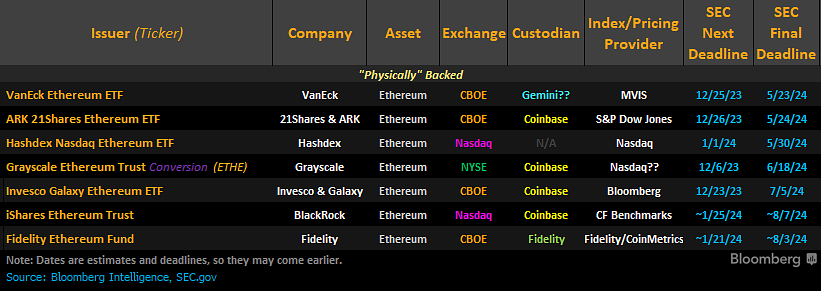Spot Bitcoin ETF approved in the US: What to expect next

Industry experts predict what to expect next following the approval of spot Bitcoin ETFs in the United States.

On Jan. 9, the United States Securities and Exchange Commission (SEC) scrambled as it tried to recover from an erroneous tweet announcing the approval of a spot Bitcoin (BTC) exchange-traded fund (ETF).
This left many members of the cryptocurrency community on pins and needles. But, just a day after this chaotic event, the SEC officially announced that it had approved the first regulated spot Bitcoin ETF in the United States.
While notable, many people may now be wondering what to expect next. The approval of spot Bitcoin ETFs in the U.S. will further lead to the institutionalization of Bitcoin, but industry experts have pointed out that other factors will come into play.
New opportunities for retail investors
Yesha Yadav, professor of law and associate dean at Vanderbilt Law School, told Cointelegraph that the introduction of a spot Bitcoin ETF holds enormous significance for the cryptocurrency and financial markets. She said:
“Most immediately, it will provide a way for everyday mom-and-pop investors to safely gain exposure to Bitcoin. ETFs are a well-regulated, retail-friendly product. This should mean that, via a spot Bitcoin ETF, crypto markets are likely to become a lot more accessible to investors who might otherwise have stayed well away from participating in a much less regulated crypto market.”
This may be the case, as the securities regulator approved 11 Bitcoin ETFs on Jan. 10, including the 19-b4 applications from highly credible institutional players such as Grayscale, BlackRock, Fidelity, WisdomTree, Valkyrie and others.
Leah Wald, CEO of Valkyrie, told Cointelegraph that Valkyrie’s spot Bitcoin ETF will be available to U.S. investors through their brokerage or investment accounts: “Any investor will be able to purchase shares of our ETF, which will be available for trading on the Nasdaq.”
Wald added that Valkyrie is anticipating upward of $400 million in assets to flow into its ETF during the first few weeks of trading. “We think that we will see billions in assets flow into the ETFs over the first month alone. Many investors have been waiting on the sidelines for products like this.”
Almost a good hour after this tweet and the number still isn’t 2.3 billy.. it did however hit $1b and $1.8b if you incl $GBTC, which are UNREAL first day numbers (records will be smashed today). My source is a consolidation of all the exchange feeds via Bloomberg terminal. FYI! https://t.co/emqwEY0Hke
— Eric Balchunas (@EricBalchunas) January 11, 2024
While it’s too early to accurately predict the performance of newly launched spot Bitcoin ETFs products, Alex Tapscott — author and managing director of Ninepoint Digital Assets Group — told Cointelegraph there may be similarities between U.S. spot Bitcoin ETFs and Canadian spot Bitcoin ETFs. For reference, Canada gave the green light for its first spot Bitcoin ETF in 2021.
Recent: Crypto critics — What’s their beef with the blockchain?
According to Tapscott, Ninepoint Digital Assets Group launched a spot Bitcoin ETF in Canada in May 2021. He said that Purpose Investments was the first fund to launch a spot Bitcoin ETF in the region, adding that the firm claims to have brought in over a billion dollars in assets within the first month.
“This is an important data point to consider because the U.S. crypto market is 10–20 times bigger than Canada’s market measured by population and investable assets,” said Tapscott.
Yet, while retail investors may benefit from a spot Bitcoin ETF in the U.S., some believe that institutions may not be as enthusiastic. Canadian venture capitalist and CNBC personality Kevin O’Leary told Cointelegraph institutions won’t want to pay the fees associated with spot Bitcoin ETFs:
“Personally, I would never use an ETF. Why would I pay those fees? I mean, it’s a ridiculous cost that is not needed, particularly with an asset that is a total commodity in the case of Bitcoin.”
However, some experts beg to differ. Bloomberg ETF analyst James Seyffart told Cointelegraph that institutions might use the spot Bitcoin ETF.
“If they want Bitcoin exposure, the spot ETF will be their vehicle of choice. But this may take some time before that happens,” he said.
Perianne Boring, founder and CEO of the Chamber of Digital Commerce, told Cointelegraph that she believes institutional investors, such as pension funds and asset managers, typically prefer regulated investment vehicles. “The approval of a spot Bitcoin ETF would likely attract greater institutional participation in the cryptocurrency market, potentially leading to increased liquidity and market stability,” she said.
Will a spot Ether ETF be next?
In addition to retail adoption, predictions around the eventual approval of a spot Ether (ETH) ETF are also circulating. Tapscott noted that spot Ether ETFs were approved shortly after spot Bitcoin ETFs in Canada:
“After Canadian regulators approved the spot Bitcoin ETFs, there was not a good reason for them not to approve spot Ether ETFs. Keep in mind though, the market for Ether is smaller than Bitcoin. As a result, there will likely be a meaningful demand and significant impact on the price of ETH.”
Vanderbilt’s Yadav added that if the spot Bitcoin ETF in the U.S. proves popular, it may help create greater permanence for Bitcoin and other crypto assets within the financial markets.
Greater acceptance of blockchain technology
Tapscott said that blockchain technology will likely gain wider acceptance amid the buzz Bitcoin ETF approval has created around the price of BTC:
“Everyone interested or involved in the crypto market will become educated about blockchain technology. This will serve as an awakening for most people around the potential for digital assets and blockchain to transform finance and other industries.”
Echoing this, Kurt Hemecker, CEO of the Mina Foundation — the nonprofit organization supporting the Mina Protocol — told Cointelegraph he believes this event creates new opportunities that people may not immediately identify. For example, he noted that the spot Bitcoin ETF approval could potentially result in a major boom for zero-knowledge-focused projects.
Related: Bitcoin ETF: ‘Sell the news’ event or pivotal crypto adoption moment?
“Bringing added legitimacy in the eyes of mainstream players, the approval may lead to not just an influx of investment but also increased adoption. Zero-knowledge blockchains, distinguished by their ability to enable enhanced levels of control over data, in other words, data sovereignty, will stand out to this growing segment of the market that values data sovereignty and security highly,” he said.
Challenges to consider
Although many positive aspects may be associated with newly approved spot Bitcoin ETFs in the U.S., there may also be some downsides.
For instance, Boring explained that counterparty risk will likely increase: “Investing in a spot Bitcoin ETF introduces counterparty risk. Investors rely on the ETF issuer to accurately track the performance of the underlying asset. If the issuer encounters financial difficulties or mismanages the fund, it can impact the ETF’s value and the investor’s returns.”
Boring added that the market price versus the net asset value of Bitcoin may be impacted. “ETF shares are traded on public exchanges, and their market price can deviate from the fund’s net asset value. This price dislocation can introduce arbitrage opportunities but may also lead to unexpected trading costs for investors.”






… [Trackback]
[…] Find More Information here on that Topic: x.superex.com/news/bitcoin/2467/ […]
… [Trackback]
[…] Here you will find 10163 additional Information on that Topic: x.superex.com/news/bitcoin/2467/ […]
… [Trackback]
[…] Here you will find 61008 additional Info on that Topic: x.superex.com/news/bitcoin/2467/ […]
… [Trackback]
[…] Information on that Topic: x.superex.com/news/bitcoin/2467/ […]
… [Trackback]
[…] Info to that Topic: x.superex.com/news/bitcoin/2467/ […]
… [Trackback]
[…] Information to that Topic: x.superex.com/news/bitcoin/2467/ […]
… [Trackback]
[…] Here you can find 23848 more Information on that Topic: x.superex.com/news/bitcoin/2467/ […]
… [Trackback]
[…] Here you can find 43783 more Info on that Topic: x.superex.com/news/bitcoin/2467/ […]
… [Trackback]
[…] Read More here on that Topic: x.superex.com/news/bitcoin/2467/ […]
… [Trackback]
[…] Read More to that Topic: x.superex.com/news/bitcoin/2467/ […]
… [Trackback]
[…] There you can find 20283 additional Info to that Topic: x.superex.com/news/bitcoin/2467/ […]
… [Trackback]
[…] Find More to that Topic: x.superex.com/news/bitcoin/2467/ […]
… [Trackback]
[…] Read More on on that Topic: x.superex.com/news/bitcoin/2467/ […]
… [Trackback]
[…] Read More here on that Topic: x.superex.com/news/bitcoin/2467/ […]
… [Trackback]
[…] Find More here on that Topic: x.superex.com/news/bitcoin/2467/ […]
… [Trackback]
[…] Info on that Topic: x.superex.com/news/bitcoin/2467/ […]
… [Trackback]
[…] Read More here on that Topic: x.superex.com/news/bitcoin/2467/ […]
… [Trackback]
[…] Read More on to that Topic: x.superex.com/news/bitcoin/2467/ […]
… [Trackback]
[…] Here you will find 58732 additional Info on that Topic: x.superex.com/news/bitcoin/2467/ […]
… [Trackback]
[…] Find More on to that Topic: x.superex.com/news/bitcoin/2467/ […]
… [Trackback]
[…] Read More to that Topic: x.superex.com/news/bitcoin/2467/ […]
… [Trackback]
[…] There you will find 94882 additional Information on that Topic: x.superex.com/news/bitcoin/2467/ […]
… [Trackback]
[…] Information to that Topic: x.superex.com/news/bitcoin/2467/ […]
… [Trackback]
[…] There you can find 85428 more Info on that Topic: x.superex.com/news/bitcoin/2467/ […]
… [Trackback]
[…] Find More here to that Topic: x.superex.com/news/bitcoin/2467/ […]
… [Trackback]
[…] Read More here to that Topic: x.superex.com/news/bitcoin/2467/ […]
… [Trackback]
[…] There you will find 53436 additional Info to that Topic: x.superex.com/news/bitcoin/2467/ […]
… [Trackback]
[…] Find More to that Topic: x.superex.com/news/bitcoin/2467/ […]
… [Trackback]
[…] There you can find 18554 more Info on that Topic: x.superex.com/news/bitcoin/2467/ […]
… [Trackback]
[…] Find More Info here to that Topic: x.superex.com/news/bitcoin/2467/ […]
… [Trackback]
[…] Find More here to that Topic: x.superex.com/news/bitcoin/2467/ […]
… [Trackback]
[…] Information to that Topic: x.superex.com/news/bitcoin/2467/ […]
… [Trackback]
[…] Here you can find 68878 more Information to that Topic: x.superex.com/news/bitcoin/2467/ […]
… [Trackback]
[…] Find More Information here on that Topic: x.superex.com/news/bitcoin/2467/ […]
… [Trackback]
[…] Here you can find 83673 additional Info to that Topic: x.superex.com/news/bitcoin/2467/ […]
… [Trackback]
[…] Find More on to that Topic: x.superex.com/news/bitcoin/2467/ […]